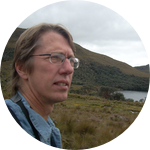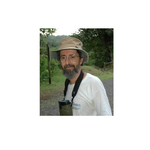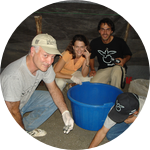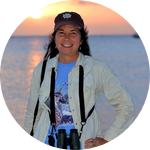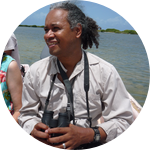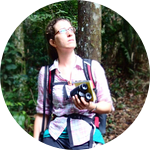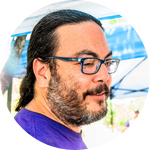About This Project
Endemic Caribbean forest birds are poorly known, threatened and in decline. Our project uses the power of citizen science volunteers to search spectrograms of field recordings for these endemic forest birds. This information will help us conserve them by giving us a better understanding of what habitats are important to these species, and how many individuals are left.
Ask the Scientists
Join The DiscussionWhat is the context of this research?
We know little about the 169 forest-dependent endemic bird species in the Caribbean, with the majority of these species lacking basic information such as how many are left, their breeding behavior or how they use their remaining habitat. Increasing availability of audio recorders is a cost-effective way of collecting valuable data from bird calls, including population size, behavior and individual identity. However, searching through audio data for individual species can be extremely labor intensive if done by ear and the technology does not yet reliably sort these calls automatically. Since humans are more efficient at visual than aural pattern detection, we will harness the power of citizen scientists to scan spectrograms in our hunt for Caribbean forest endemic birds.
What is the significance of this project?
It is widely recognized that island endemic and forest-dependent species are especially prone to extinction. The Caribbean is a hotspot for bird diversity and endemism. Despite this importance, a quarter of Caribbean forest endemic birds are endangered and nearly half the common species are thought to be declining. These birds are under great threat from human activities including deforestation, hunting, and climate change. Without knowing the answer to questions such as how populations change over time, how they respond to threats and management actions, and how they move across the landscape, it is a challenge to successfully conserve these species. By filling these critical information gaps, we can better inform decision-making by global, regional and local conservation organizations.
What are the goals of the project?
Our ultimate goal is to improve our understanding of Caribbean endemic forest birds, to provide the basis for improving their conservation. To allow us to achieve this our project has 4 main goals:
1. Develop an online infrastructure to allow volunteers to find forest endemics through visual spectrogram inspection
2. Develop an open access, online database of spectrograms
3. Populate the online database with audio-recording test data from a pilot Caribbean island
4. Demonstrate the proof-of-concept application of volunteer sorted spectrograms to analyze the distribution and abundance of forest endemics on a pilot Caribbean island
Budget
The funding for this project will allow us to develop an online system for volunteers to sort through spectrograms of recordings from habitats where Caribbean endemic birds are thought to occur. Bioacoustic software essential to managing audio-recordings and converting them into spectrograms, will be obtained through this project. Funds are also required to support the development of the database and citizen science interface, and a computer system for efficient data management and analysis. Additional contributions would greatly increase the capacity for establishing a network of collaborators across the region, through supporting a workshop on our system at the 2017 BirdsCaribbean Bi-annual Conference, and provision of basic audio-recorders to attendees.
Endorsed by
Meet the Team
Affiliates
Affiliates
Team Bio
We are a dedicated group of researchers and volunteers from BirdsCaribbean, the largest bird conservation NGO in the Caribbean. Our team comprises leading regional wildlife ecologists and wildlife educators. Together our expertise includes field biology, quantitative ecology, audio analysis, database management and civil society engagement. We will use our BirdsCaribbean network to engage researchers in using bioacoustics to increase our understanding of endemics birds.
Howard Nelson
I am a University of Wisconsin-trained wildlife biologist and forester who has been working in the Caribbean for the last 26 years. I am passionate about wildlife conservation in the region, and about how we make the Caribbean a place where people can co-exist with, and benefit from, the regions unique wildlife. I’ve been working on birds in the Caribbean since 1989, and have been involved in Caribbean bird conservation through BirdsCaribbean since 1991 and was president from 2012-2014.
Over the past 2 decades my conservation work has taken me from the NGO sector as CEO of the Asa Wright Nature Centre, to government as an environmental policy specialist in Trinidad and Tobago’s Ministry of the Environment, and subsequently in academia, at the University of the West Indies-St Augustine and currently at the University of Chester, UK.
My areas of research include sustainable use of tropical wildlife, tropical forestry, endangered species management, conservation on island ecosystems, and sustainable livelihoods & community based conservation.
My involvement interest in this project began as the outcome of a workshop I chaired at the 2014 BirdsCaribbean biannual meeting in Jamaica. At that session, all the participants realised that we were beginning to see a troubling pattern among forest endemic birds of the region – we were lacking some of the most basic kinds of population information, we needed to actually conserve these birds. This project is a direct outcome of that meeting – and an effort to begin to address this issue.
Ellie Devenish-Nelson
I have been passionate about conserving Caribbean biodiversity since my first visit to Trinidad 15 years ago. I have been involved in avian, mammalian and vegetation research projects throughout the Caribbean ever since. My research interests are in quantitative ecology and threatened species ecology. I am interested in using long-term ecological data to bring new insights for wildlife conservation and management decision-making. I am keen to apply new techniques to answer conservation questions, and have been exploring the use of bioacoustics since we started making field recordings in Trinidad, Tobago, Grenada and Suriname several years ago.
I am currently a Teaching Fellow for on online MSc in Biodiversity, Wildlife and Ecosystem Health at the University of Edinburgh and a Research Associate at the University of Chester, UK. Most recently, I worked as a Postdoctoral Research Assistant at the University of Chester, modelling climate change impacts on dry forest habitats in Grenada. I have previously taught for the University of the West Indies online MSc in Biodiversity Conservation and Sustainable Development in the Caribbean. I completed my PhD at Durham University, and studied for an MSc in Conservation at University College London and a BSc in Zoology at the University of Leeds. I have been an active member and attended BirdsCaribbean regional meetings since 2008.
Mark Yokoyama
I am an American naturalist, author and wildlife educator residing on Saint Martin. I have a Bachelor of Arts from Harvard University and am a former President of the Oregon Entomological Society. I have spent the last six years documenting terrestrial biodiversity in the Lesser Antilles. I have published two editions of The Incomplete Guide to the Wildlife of Saint Martin, the first book of its kind on the island, and I am currently working on a guide to the terrestrial wildlife of Sint Eustatius.
I am co-founder and Treasurer of the non-profit association Les Fruits de Mer. Les Fruits de Mer activities include public wildlife events, e-books on wildlife subjects, short documentary films, and Amuseum Naturalis, a pop-up natural history museum. I have collaborated with a number of scientists and conservation organizations, and write a weekly column in The Daily Herald. My photographs have been published in dozens of books and publications, including The New York Times and The Economist.
My work is available for free download at http://www.lesfruitsdemer.com.
Project Backers
- 53Backers
- 65%Funded
- $2,566Total Donations
- $48.42Average Donation
